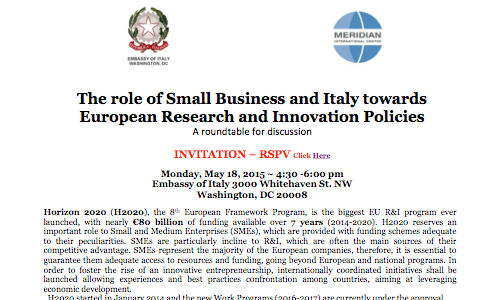This is the presentation that I gave on May the 18th at the Italian Embassy in Washington, DC.
In this presentation I provide a quick introduction to the Meridian Fellowship on Social Innovation and to my project, Talent Europe. I then present some of the latest numbers regarding the implementation of the SME Innovation instrument, one of the most innovative parts of the 8th presentation Framework program called Horizon 2020. I also discuss about three concepts that I think might be interesting to explore as a basis of a useful comparison between Europe and US science and technology Policy.
What I am seeking to do as a Meridian Fellow is to expand my expertise on science and technology policy and to contribute to the debate around this topic that is developing in Europe. I think that there are better ways to engage and to empower EU talent, and to make it become key player of EU Economic Recovery and competitiveness
The US had been a continuous source of inspiration for the EU debate on science and technology, and more in general on innovation policy.
Later on I will discuss about the SME innovation instrument that had been inspired in part by the SBIR program here in the US.
Not only policy makers and scholars have been guiding this exchange of ideas and experiences, but also US Embassies in Europe have been very important in sharing with Europe some news. I am very familiar with the case of the US Embassies in Italy. The past three Ambassadors have been evangelists of messages and priorities. Ronald Spogli emphasized the role of high tech entrepreneurs in society, David Thorne has focused on the role the digital economy can have a driver of growth, more recently the sitting ambassador, John Phillips is very vocal about the benefits that Italy could derive by a more efficient judiciary system
My experience as scholar, and teacher is telling me that the debate on innovation in Europe is desperately in need of some fresh air and new ideas.
I believe that there are four areas where we can look.
The first one has to do with new original ways to communicate the relevance of sicence and technology for society.
The second has to do with the way we mentor and assist scientists and engineers that seek to become entrepreneurs. What is the role of universities, government and private sector to achieve this task.
Third area is corporate entrepreneurship, industrial venturing and the attitude EU large corporations have towards change.
Finally demands side innovation policy: public procurement and the setting of challenges and ambitious goals, where sometimes the role of the government should not be to provide the means to achieve these goals, but to promise to act as first buyer for the best solutions for a specific challenge.
